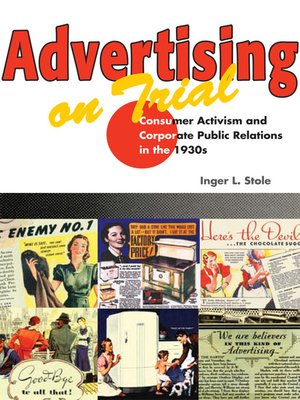Advertising on Trial
ebook ∣ Consumer Activism and Corporate Public Relations in the 1930s · The History of Media and Communication
By Inger L. Stole

Sign up to save your library
With an OverDrive account, you can save your favorite libraries for at-a-glance information about availability. Find out more about OverDrive accounts.
Find this title in Libby, the library reading app by OverDrive.



Search for a digital library with this title
Title found at these libraries:
| Loading... |
Inger L. Stole examines how consumer activists sought to limit corporate influence by rallying popular support to moderate and change advertising. Stole weaves the story through the extensive use of primary sources, including archival research done with consumer and trade group records, as well as trade journals and engagement with the existing literature. Her account of the struggle also demonstrates how public relations developed in order to justify laissez-faire corporate advertising in light of a growing consumer rights movement, and how the failure to rein in advertising was significant not just for civic life in the 1930s but for our era as well.
|Preface vii 1. The Rise of a Corporate Culture: Early Consumer Response 12. Advertising Challenged: The Creation of Consumer's Research Inc. and the Rise of the 1930s Consumer Movement 21
3. The Drive for Federal Advertising Regulation, 1933-35 49
4. A Consumer Movement Divided: The Birth of Consumers Union of the United States Inc. 80
5. Defining the Consumer Agenda: The Business Community Joins the Fray 106
6. Legislative Closure: The Wheeler-Lea Amendment 138
7. Red-Baiting the Consumer Movement 159 Epilogue 185
Appendix A: Key Players 199
Appendix B: Legislative Developments, 1933-38 205
Notes 209|"Inger L. Stole has written a compelling history of the substantive consumer movement in the 1930s the pushed for Congressional regulations on advertising. . . . and illuminates an important historical struggle here that stands on its own, delivering a strong argument about activism and power that has human and democratic implications for society." —American Journalism
"Explores a both fascinating and important period in American advertising and public relations. . . . Readable and insightful study."—Communication Booknotes Quarterly
"An important contribution to the exciting field of consumer history. . . . Stole's meticulously researched study reminds us that the ascendancy of advertising as a dominant institution in American society was not without significant resistance."—Business History Review
|Inger L. Stole is a professor in the Department of Communication at the University of Illinois at Urbana-Champaign. She is the author of Advertising at War: Business, Consumers, and Government in the 1940s and coeditor of A Moment of Danger: Critical Studies in the History of U.S. Communication since World War II.






